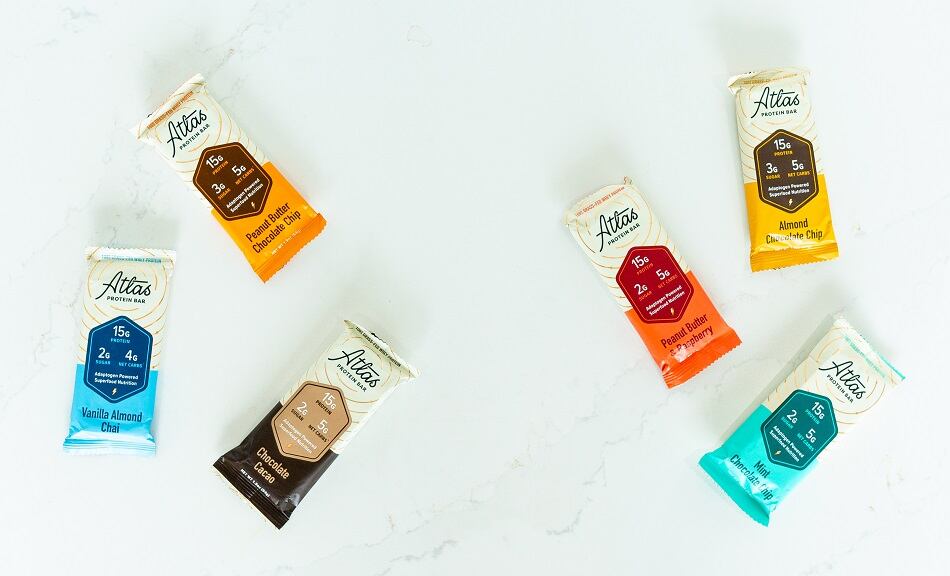Founder and certified sports nutritionist James Oliver wanted to create a protein bar brand that hit on "three nutritional truths", which include maximizing "real food" ingredients, minimizing added sugar, and using high quality sources of protein.

"I couldn’t find a bar that fit all those criteria. There are other brands that have been very successful at really putting their stake in the ground on one or two of those principles. I thought if I made a brand that hit all three of them, I could probably be very successful," Oliver told FoodNavigator-USA.
He set to work on creating the Atlas Bar brand while he was still in college at Tufts University and training for the Ironman triathlon as well as studying for the GMAT (Graduate Management Admission Test).
Using money he earned from driving Uber, Oliver did an initial production run of 2,000 protein bars.
"I figured that worst case scenario, nobody would like them and I would just have to eat a few thousand protein bars that I really liked."
"Fortunately, that did not happen," said Oliver, who sold out of protein bars after the first production run before officially launching on his website in 2017.
"Doing this [direct-to-consumer] model, has allowed me to do the proof of concept model without bringing on any additional funding. It also allowed us to launch quickly and have complete control over the customer experience."
Atlas Bar is also sold through Amazon where it has earned an "Amazon's Choice" designation, which means the brand has received high customer satisfaction ratings.
High nutrition, minimal ingredients
Atlas Bar products, which are sweetened with monk fruit, and contain a blend of ashwaganda and maca root, contain 16 g of protein (from grass-fed whey), 2-3g of sugar, and 4-5g net carbs.
The brand went with grass-fed whey protein because when looking at the nutrition research, Oliver found that it consistently ranked as the #1 or #2 protein in terms of bioavailabilty and quality, he said.
A 2015 study published in the Journal of Food Science found that whey protein has a faster absorption rate compared to plant and egg protein sources, and supports lean muscle mass development.
The brand started with three flavors: chocolate cacao, peanut butter chip, and vanilla almond (SRP $2.99). It will introduce three more flavors next month (peanut butter raspberry, almond chocolate chip, and mint chocolate chip) when it launches its Kickstarter crowdsourcing campaign in mid-October.
Standing out in a crowded category
While the protein bar category reached $7bn in sales in the US, year-over-year growth is expected to slow and bar manufacturers must establish unique selling points and attainable price points to stand out in such a crowded category, according to Mintel.
To set itself apart, Atlas Bar underwent a rebranding process, which included new packaging, logo, tagline, formulation, and website based on online consumer feedback.
"We read every piece of feedback and use that feedback to guide us as we evolve and grow,” said Oliver.
The new packaging, according to Atlas Bar's new head of marketing PJ Roustan, is "as thoughtful, functional and easily digestible as the wholesome, high-performance ingredients inside."
One of the main goals of the rebranding process was to better display its macronutrient profile. The new packaging features bold color blocking offset by ample white space and metallic foiling.
To further establish itself as formidable opponent in the protein bar category, Atlas Bar has also recruited new talent to lead the brand including Roustan who was the former marketing director for Mondelēz International’s recently acquired Perfect Snacks; creative director Chris Wright formerly of Perfect Snacks; and national sales director Melissa O’Connor, formerly of Country Archer Jerky Co.
Once Atlas Bar completes its Kickstarter campaign, the brand will begin to enter physical retail stores aiming to achieve nationwide distribution, according to Oliver.
"Once we have all six flavors available online and to our consumers, we are really going to start to make a push into retail," said Oliver.
What does the future hold for protein bars in the sports & fitness category? Find out during our FREE editorial webinar on Wednesday, Sept. 25th. Register and check out our fantastic lineup of panelists HERE!


